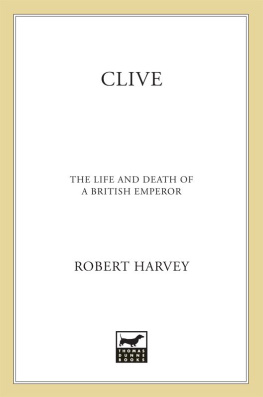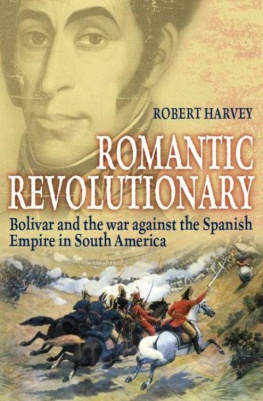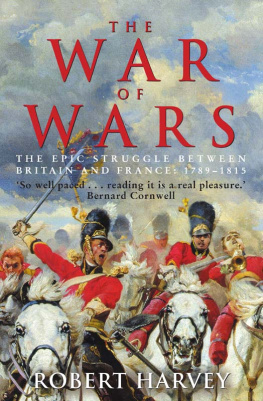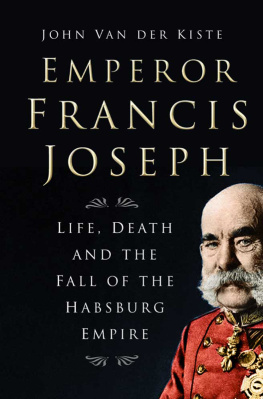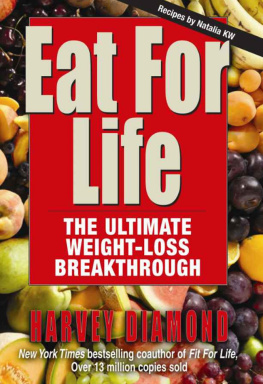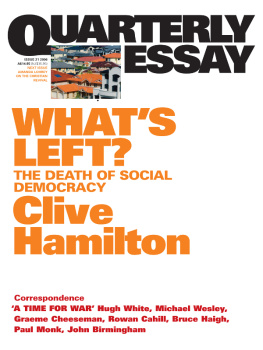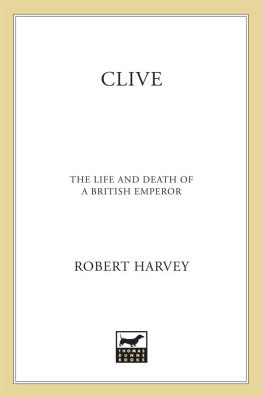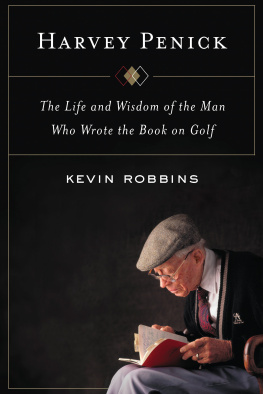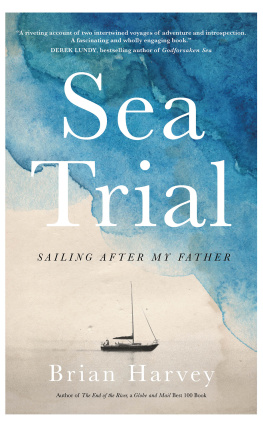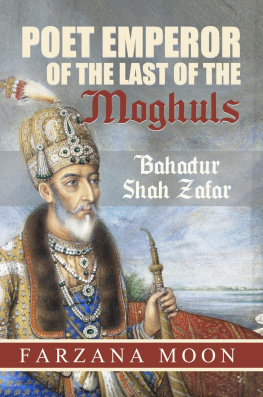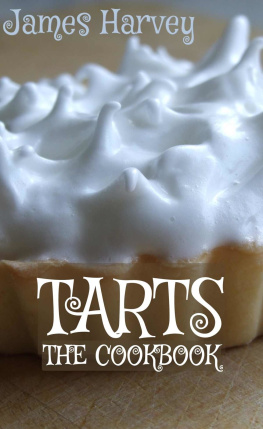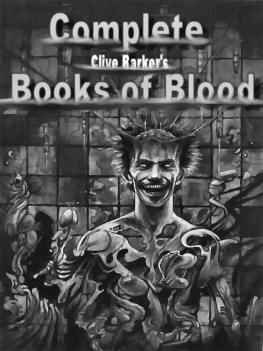Robert Harvey - Clive: The Life and Death of a British Emperor
Here you can read online Robert Harvey - Clive: The Life and Death of a British Emperor full text of the book (entire story) in english for free. Download pdf and epub, get meaning, cover and reviews about this ebook. year: 2000, publisher: St. Martins Press, genre: Home and family. Description of the work, (preface) as well as reviews are available. Best literature library LitArk.com created for fans of good reading and offers a wide selection of genres:
Romance novel
Science fiction
Adventure
Detective
Science
History
Home and family
Prose
Art
Politics
Computer
Non-fiction
Religion
Business
Children
Humor
Choose a favorite category and find really read worthwhile books. Enjoy immersion in the world of imagination, feel the emotions of the characters or learn something new for yourself, make an fascinating discovery.
- Book:Clive: The Life and Death of a British Emperor
- Author:
- Publisher:St. Martins Press
- Genre:
- Year:2000
- Rating:5 / 5
- Favourites:Add to favourites
- Your mark:
- 100
- 1
- 2
- 3
- 4
- 5
Clive: The Life and Death of a British Emperor: summary, description and annotation
We offer to read an annotation, description, summary or preface (depends on what the author of the book "Clive: The Life and Death of a British Emperor" wrote himself). If you haven't found the necessary information about the book — write in the comments, we will try to find it.
Clive: The Life and Death of a British Emperor — read online for free the complete book (whole text) full work
Below is the text of the book, divided by pages. System saving the place of the last page read, allows you to conveniently read the book "Clive: The Life and Death of a British Emperor" online for free, without having to search again every time where you left off. Put a bookmark, and you can go to the page where you finished reading at any time.
Font size:
Interval:
Bookmark:
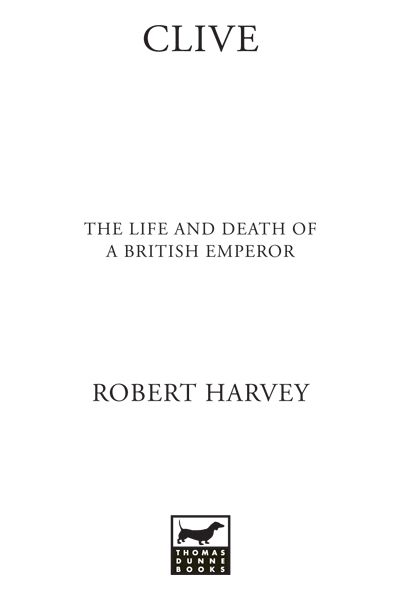
The author and publisher have provided this e-book to you for your personal use only. You may not make this e-book publicly available in any way. Copyright infringement is against the law. If you believe the copy of this e-book you are reading infringes on the authors copyright, please notify the publisher at: us.macmillanusa.com/piracy.
Contents
F OR A NTONELLA ,
A BDULLAH , B ADIA ,
A BDULLILAH, AND H ASEN
Acknowledgements
I owe a huge debt to a great many people who have assisted me in the preparation of the first major biography of Clive in two decades. Since boyhood I have been an admirer of Clive, and Macaulays famous Essay ignited a real admiration towards this extraordinary figure. Two books that came out in my youth, Mark Bence-Joness Clive of India and Michael Edwardess Plassey, rekindled my enthusiasm.
Bence-Joness work, one of the two best biographies of Clive, is a masterpiece of scholarship and elegant writing, while Edwardess book is direct and militarily compelling, and to them I owe heartfelt thanks for indicating some of the direction that my research should follow although in most cases the conclusions and judgments are very different from theirs and are no ones responsibility but my own. Sir John Malcolms detailed Life of Lord Clive remains, of course, the most fruitful treasury of correspondence and papers, but the meticulously kept and helpful India Office library in London, the National Library of Wales, the National Army Museum in Chelsea, and other letters and documents still in private hands such as those provided by Christopher Stainforth provide a fertile field for original research. I am grateful to them all.
I am also enormously indebted to the Earl and Countess of Plymouth, as well as Viscount and Lady Windsor, for their hospitality and help; likewise to Michael and the Hon Mrs Michael Woodbine Parish, Robin and the whole family, who quite apart from specific help, exposed one at an early age to the cheerful aura of a major Clive house; to the Rector of Moreton Saye; to Countess Bina Sella Di Monteluce, Deepak Vaidya and Indian friends too numerous to mention; to Peter Holt, a descendant of Clives and gifted chronicler of his travels; to Dr Martin Scurr, for his invaluable advice on Clives health; to Paul and Maureen Marriott, whose early enthusiasm for Clive always communicated itself to me as did that of Phyllis and Joce Humphreys for India; to Raleigh Trevelyan, whose advice and clear, penetrating insights into India are among the best there are; to Dr David Atterton, for his encouragement; to Lawrence James, whose tours de forces on the British Empire risk becoming definitive; to Andrew Williams, who knows India so well; to Dr Jonathan Wright of Christ Church, who steered me in one significant part of my research; and to Powys Castle, which contains many interesting relics of Clive. I also owe a huge debt to my former headmaster, Michael Phillips of Elston Hall, and my former Modern Tutor at Eton, John Peake, who instilled in me a passion for history.
I am personally vastly indebted to my brilliant agent Gillon Aitken; to my enthusiastic and painstaking assistant, Jenny Thomas, and her historian husband Geoffrey; to my gifted and warmly encouraging editors Roland Philipps and Angela Herlihy; to my mother and sister, always founts of love and support; and above all, as always, to my darling Jane and Oliver, who have to endure the hard slog, moodiness and single-mindedness of a writers life, always restoring cheerfulness.
I am very grateful to Mark Bence-Jones, Raleigh Trevelyan, Lawrence James and Peter Holt for permisson to quote from their books. For the picture credits I am grateful to the Oriental and India Office Collections, the National Trust and the Hon Mrs Michael Parish.
Am I not rather deserving of praise for the moderation which marked my proceedings? Consider the situation in which victory at Plassey had placed me. A great prince was dependent on my pleasure; an opulent city lay at my mercy; its richest bankers bid against each other for my smiles; I walked through vaults which were thrown open to me alone, piled on either hand with gold and jewels! Mr Chairman, at this moment I stand astonished at my own moderation!
Robert Clive
No oath which superstition can devise, no hostage however precious, inspires a hundredth part of the confidence which is produced by the yea, yea, and nay, nay of a British envoy.
Lord Macaulay, Essay on Clive
Whilst I could easily understand the reaction of a new generation to the imperial mystique I knew that it had not all been hypocrisy, exploitation, lust and plunder, but that there had also been a degree of selflessness among a great many who had served in India and given their lives to it.
Raleigh Trevelyan, The Golden Oriole
B OOK O NE
B ORN A S OLDIER , 17251756
C HAPTER 1
Burial at Dusk
A moody, grey-grim, prematurely frosty evening in late November in the mid-eighteenth century, in one of the most obscure parts of central England. The buttress-hedged, snow-covered dirt-tracks are devoid of traffic, the window-coverings of the farmers and artisans cottages in place to keep in the warmth of the blazing, smoky fires and expel the ferocity of the cold. It is dusk, and the last light is fading. Anxious faces can be seen occasionally peeping from the windows. Ploughmen returning home, the odd venturesome older child, are outside, watching the road from the safety of thickets and copses of trees.
Some noble carriages have already passed up to the church. Some of the more confident and wealthy members of the farming community have walked there to pay their last respects.
Through the murk the sparking clatter of wheels on the rough stones of the lane can be heard approaching. The hidden watchers stiffen. Horses hooves pound into earshot; there is not one carriage, but several, as though a small army were riding into battle. Those farthest down the lane first witness the spectral procession through the dusk. A huge carriage, draped entirely in black, is at its head. The carriage denotes a man of immense power and wealth. Behind follows a succession of seven or eight carriages, the ones at the front equally splendid, funereal, spectral, the last bearing servants in livery.
It is a terrifying sight for remote country folk, the passage of a black prince and his retainers to his funeral after nightfall. This was the burial, in Macaulays phrase, of a great wicked lord who had ordered the walls around his house to be made so thick in order to keep out the devil.
* * *
The thundering black carriages sped past the gawping onlookers like ghostly apparitions. Further on, they slowed and adopted a more respectful pace. As the procession clattered along the road, through the encroaching darkness, the glint and polish of magnificent coaches and liverymen dressed in black must have seemed awesome to the silent, hidden watchers.
Finally, the procession reached the very slight rise on which the then very humble church of Moreton Saye was perched, and the coaches disgorged their occupants, the women in the ample veils and black finery of loud mourning, the men stiffened in respect. The servants, with their black costumes and impassive faces, looked like the outriders of death. The huge wooden coffin was borne in, defying ecclesiastical regulations that burials must not take place after dusk.
Gloom, sadness and secrecy pervaded. It was a burial in a hurry, and in shame; ostensibly that of a suicide who by canon law could not be buried in the consecrated ground of a graveyard, never mind in church itself. The funeral was solemn, subdued, punctuated by the sobbing of some of the women present and the silent grief of the men.
Next pageFont size:
Interval:
Bookmark:
Similar books «Clive: The Life and Death of a British Emperor»
Look at similar books to Clive: The Life and Death of a British Emperor. We have selected literature similar in name and meaning in the hope of providing readers with more options to find new, interesting, not yet read works.
Discussion, reviews of the book Clive: The Life and Death of a British Emperor and just readers' own opinions. Leave your comments, write what you think about the work, its meaning or the main characters. Specify what exactly you liked and what you didn't like, and why you think so.

